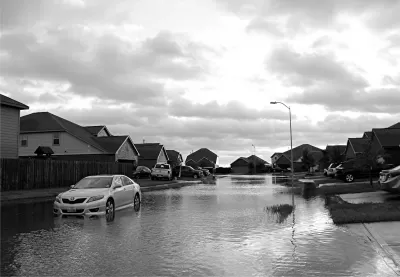The troubling trend is particularly pronounced in lower-income communities, where experts worry households are being inadvertently set up for big financial losses.

In a piece reported by Huo Jingnan, Rebecca Hersher, Tegan Wendland, Steve Newborn, and Daniel Rivero, NPR finds that the federal government has routinely sold flood-prone homes to buyers without disclosing their risks. The investigation "finds that the homes HUD [Department of Housing and Urban Development] sells are disproportionately located in flood-prone places, compared with Zillow records of all homes sold in the United States," despite HUD's stated mission to provide "safe, affordable housing" for American families.
NPR found that "[h]omes that were sold by HUD between January 2017 and August 2020 are in federally designated flood zones at almost 75 times the rate of all homes sold nationwide in that period," with the problem most pronounced in Louisiana, Florida, and New Jersey. "In many cases, buyers of HUD homes get less information about flood risk and the cost of flood insurance than if they were to purchase the house from a private seller."
Additionally, "NPR's analysis finds that the households in neighborhoods where HUD has sold homes are poorer on average than those in areas where HUD has not sold homes." This is particularly troubling as "[i]n the long term, flooding can wipe out a family's generational wealth by driving down home values or destroying homes altogether." Meanwhile, new federal rules will eliminate subsidies that kept flood insurance affordable for many coastal homeowners.
"HUD initially did not respond to specific questions about how it might work more closely with FEMA to reduce flood risk, or how its home sales in flood zones might impact low-income buyers," but defended the sales, stating that "[l]ocking low-income homebuyers out of a great number of affordable homeownership opportunities because the homes are located in communities within flood zones not only runs contrary to the Administration's objectives of achieving greater equity in homeownership, but prohibiting sales based on income would be comparable to sanctioning a resurgence of redlining."
The agency claims they are "'engaging with FEMA and other federal partners to look at policies, operations, and actions' that would make the nation's housing stock more resilient to climate change."
FULL STORY: The Federal Government Sells Flood-Prone Homes To Often Unsuspecting Buyers, NPR Finds

Maui's Vacation Rental Debate Turns Ugly
Verbal attacks, misinformation campaigns and fistfights plague a high-stakes debate to convert thousands of vacation rentals into long-term housing.

Planetizen Federal Action Tracker
A weekly monitor of how Trump’s orders and actions are impacting planners and planning in America.

Chicago’s Ghost Rails
Just beneath the surface of the modern city lie the remnants of its expansive early 20th-century streetcar system.

Bend, Oregon Zoning Reforms Prioritize Small-Scale Housing
The city altered its zoning code to allow multi-family housing and eliminated parking mandates citywide.

Amtrak Cutting Jobs, Funding to High-Speed Rail
The agency plans to cut 10 percent of its workforce and has confirmed it will not fund new high-speed rail projects.

LA Denies Basic Services to Unhoused Residents
The city has repeatedly failed to respond to requests for trash pickup at encampment sites, and eliminated a program that provided mobile showers and toilets.
Urban Design for Planners 1: Software Tools
This six-course series explores essential urban design concepts using open source software and equips planners with the tools they need to participate fully in the urban design process.
Planning for Universal Design
Learn the tools for implementing Universal Design in planning regulations.
planning NEXT
Appalachian Highlands Housing Partners
Mpact (founded as Rail~Volution)
City of Camden Redevelopment Agency
City of Astoria
City of Portland
City of Laramie





























